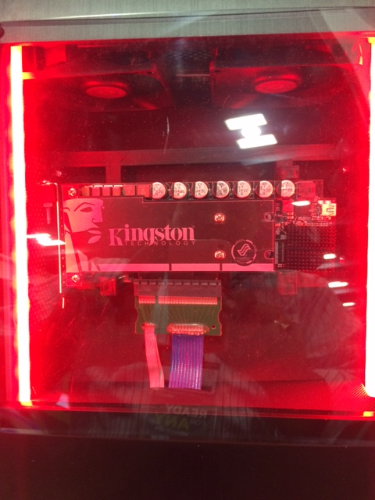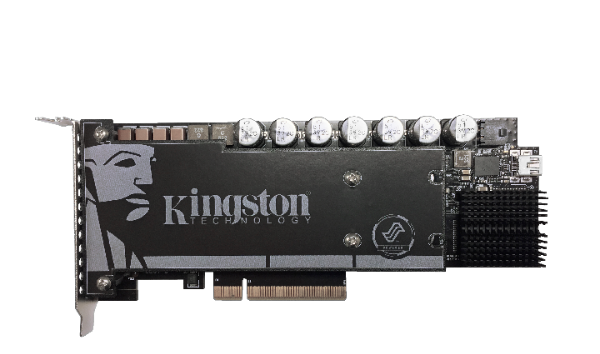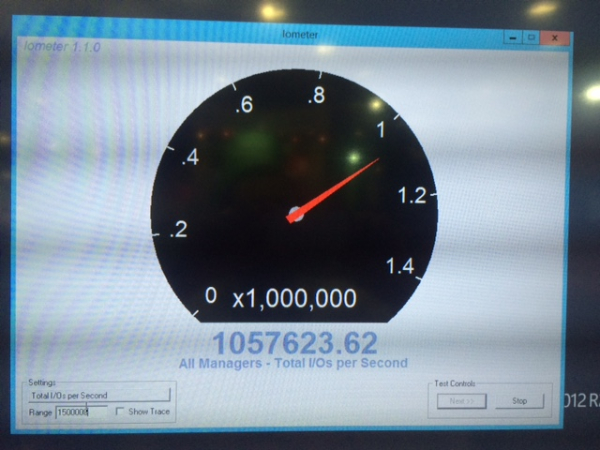Kingston Shows Blazing Fast, Low-Latency PCIe NVMe SSD At VM World
I didn't attend VM World this year, but I wish that I had. At the show, Kingston displayed for the first time an upcoming product we're very excited to learn more about -- the E1000. It's a modular add-in card that hosts multiple commodity NVMe SSDs.
The Kingston E1000 is a radical departure from the current PCIe NVMe SSDs on the market today. Products like the Intel DC S3700 use expensive controllers with 16 channels. The Micron P320h is even more radical with 32 channels and Single-Level Cell (SLC) NAND flash. SLC flash and large multiple channel controllers are expensive, even for enterprise-class budgets.
Enter the Kingston E1000 with four client PCIe NVMe SSDs that sit in a modular add-in card. The card takes care of host power fail protection and other reliability enhancements, making client SSDs a viable option for enterprise applications. Most client SSDs use either four or eight channels and cost significantly less to design and manufacture compared to large die enterprise flash processors that scale to 32 channels. Cost will be the key enabler for NVMe adaption with virtualization as the killer application.
Chipsets from Intel allow system administrators to run RAID with Rapid Storage Technology (RST and RSTe) at the driver level. The feature is the backbone of Intel's upcoming DC P3608, which takes two expensive NVMe controllers and runs them in RAID 0 or RAID 1 on a single card. The Kingston E1000 can operate the same way.
The PCIe host card is the key for the E1000. Kingston can use any m.2 PCIe SSD with any controller and flash combination. We learned earlier this summer that Kingston was an investor in Liqid's $5.7M Seed Round. It is our belief that both companies worked closely together to enable the E1000. We have seen an early preview of what the Liqid team is working on, and all we can say is this type of disruptive technology only scratches the surface. Liqid is a company still in stealth mode, but gradually more information will leak as the company allows additional disclosure.
As a single device, the E1000 can deliver higher performance compared to existing PCIe NVMe products. At VM World, Kingston displayed the E1000 operating at more than 1 million random IOPS. This is the Holy Grail for random single device performance that, until now, was measured rack space and not a single PCIe 3.0 eight-lane slot.
| Product | SATA SSD | E1000 NVMe SSD |
|---|---|---|
| # of SSD | 12 | 1 |
| # of HBA | 3 | - |
| IOPS | ~850,000 IOPS | ~1,100,000 IOPS |
| Seq Read | ~6.7 GB/s | ~6.4 GB/s |
| Latency | ~175 us | ~60 us |
| Power | ~90 Watts | ~27 Watts |
We received a comparison of what it would take to achieve compatible sequential performance from client SATA SSDs and HBAs to match the E1000. It would take 12 SATA SSDs and three LSI HBAs to reach the same 6.5 GB/s plus sequential performance. The SATA configuration would also use 3x the power and still have 3x the latency compared to the Kingston E1000.
Get Tom's Hardware's best news and in-depth reviews, straight to your inbox.
Kingston has yet to disclose the MSRP of the E1000 or capacity sizes, but we expect the single AIC solution will sell for less than the SATA array and have capacity sizes up to 4 TB before overprovisioning.

Chris Ramseyer was a senior contributing editor for Tom's Hardware. He tested and reviewed consumer storage.
-
alfanet Holy mother of I/O's, this is the kind of technology that I love to see from time to time.Reply -
blazorthon The first "normal" PCIe SSD cards were basically this except with multiple integrated SATA drives in RAID instead of NVMe drives in RAID. It's a great product, don't get me wrong, but I'm not at all surprised to see this.Reply
Eventually, we might be able to make controllers that can handle all of this in a more affordable package than what we have now. then we go back to native PCIe and it's all great, then the next thing comes along and we go back to scaling up in this way.
However, adding the power protection to the card so that the SSDs themselves don't need it was a very nice touch. -
razor512 How fast does windows 95 boot when installed on that drive, along with an overclocked core i7 5960x?Reply -
blazorthon ReplyHow fast does windows 95 boot when installed on that drive, along with an overclocked core i7 5960x?
Depends on how quickly you can get into VMWare on windows 10 :P


